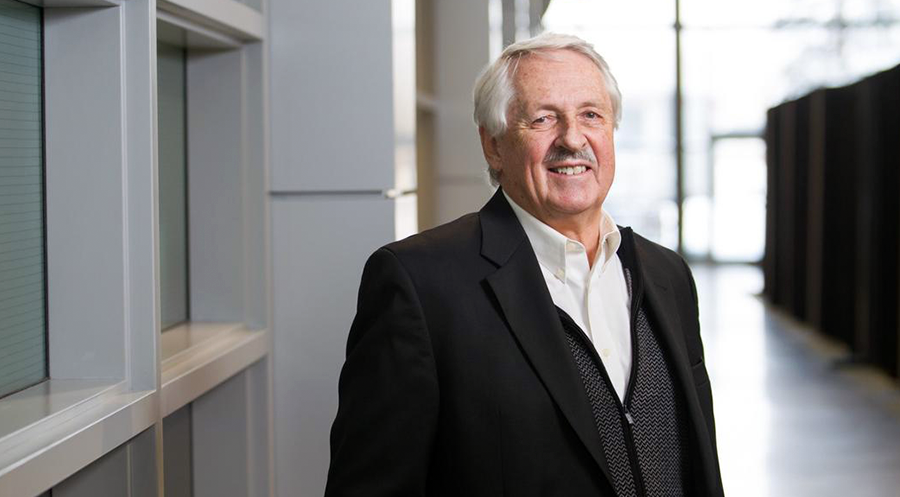Remembering Dr. George Wyse — Canadian cardiac arrhythmia pioneer, beloved mentor, and early CANet champion
Early this year, a giant of Canadian electrophysiology, Dr. George Wyse, passed away peacefully at his Canmore home in Alberta, Canada.
“Dr. Wyse is a pioneer in heart rhythm research and care in Canada,” says Dr. Anthony Tang, CEO and Scientific Director, CANet, continuing, “He was always very generous with his time and energy helping all of us to succeed. Even when he was not physically well, he continued to offer advice and mentorship to all of us voluntarily. He is very much missed already in our community.”
Dr. Wyse was pivotal in shaping the foundation of CANet. He also played a key part as an internal reviewer for both the original and renewal CANet applications to the Networks of Centres of Excellence – both leading to success.
As a member of CANet’s Research Management Committee (RMC), Dr. Wyse helped formulate the Network’s strategic plan, including reviewing the Network’s 50+ research projects to ensure that they maintained a high level of excellence expected of Canadian arrhythmia research.
He was a mentor on multiple projects, giving essential advice and direction.
Dr. Katherine Allan, Research Associate for Canadian Sudden Cardiac Arrest Network (C-SCAN) — a collaboration between CANet and the Canadian Resuscitation Outcomes Consortium — remembers Dr. Wyse as “incredibly kind and funny” who “provided really helpful advice” on her project on creating a shared decision-making tool for patients with Atrial Fibrillation (AF). Both were colleagues on the CANet Research Management Committee, and she remembers him as being “always so friendly and encouraging, even when I was only a trainee member.” Like many of Dr. Wyse’s colleagues, she always appreciated how he treated her as a “colleague and not as a trainee.”
“I have nothing but good memories of Dr. Wyse,” says Dr. Ratika Parkash, Physician, Scientist, and Professor of Medicine, Dalhousie University. “He was kind, generous, and legendary all at the same time—a rare combination. As a mentor, he was supportive but provided appropriate feedback when asked, which was extremely helpful as I planned trials in AF.”
In fact, at the initial CANet meetings for students and junior faculty, he would give a talk loosely titled ‘Wisdom from Wyse.’
“These were the most perceptive, helpful, and sensible reflections advice for early career researchers that I have ever heard,” remembers Dr. Paul Dorian, Physician, Professor of Medicine, and Scientist at the University of Toronto.
Dr. Wyse was a constant and enthusiastic participant in CHAT’s (CANet Highly Qualified Personnel Association for Trainees) mentorship/career guidance workshops, a judge at trainee poster competitions, abstract writing workshops, and networking events.
He was also the Country Expert on CANet’s International Expert Advisory Committee (IEAC), providing Canadian insights on cardiac research for international experts reviewing critical projects considered for CANet funding.
“Dr. Wyse was a strong supporter of Canadian cardiology research. He invested a lot of time in helping others design and run their studies. He mentored young investigators and played a leading role in the Canadian peer-review process – at one point, chairing the CIHR committee,” remembers Dr. Jeff Healey, Director of Arrhythmia Services and Professor of Medicine at McMaster University.
Dr. William McIntyre, Professor of Medicine at McMaster University, recalls Dr. Wyse’s Canadian Stroke Prevention Intervention Network lecture on how to give a talk. “His approach to lectures has shaped the way I give talks, and I think of his ‘ten pearls’ often,” remembers McIntyre, who was a trainee when he first heard that lecture. This lecture went on to become a staple at CHAT’s annual conferences.
Research by Dr. Wyse led to fundamental changes in the way cardiac arrhythmias are treated – in specific – the reduction in the use of certain anti-arrhythmic agents. Initially, he wanted to explore mechanisms of anti-arrhythmic drugs and ways to prevent ventricular arrhythmias. He later switched from bench research to bedside practice and became one of the leading clinical trials figures in Canada and worldwide.
For example, his Atrial Fibrillation Follow-up Investigation of Rhythm Management (AFFIRM) trial, according to Dr. Healey, was “game-changing.” The work remains one of the most cited papers in atrial fibrillation research, and in many ways, remains “the foundation for all new studies of how to manage atrial fibrillation.” Dr. Healey continues, “AFFIRM had a very simple idea that was very difficult to study. In the end, it is a testament to the meticulous nature of George’s work that the unexpected finding of AFFIRM has been accepted so quickly and widely.”
“He performed pivotal clinical trials that altered the course of therapy in heart rhythm disorders,” informs Dr. Parkash. “His work in rate and rhythm control in AF remains influential to this day.”
The former chair of CANet’s Training and Education Committee, Dr. Martin Gardner, echoes a similar sentiment. “The AFFIRM study is still so relevant – the finding that patients with a history of atrial fibrillation who maintain sinus rhythm continue to be at risk for stroke and need to continue on anticoagulants,” he says.
Apart from AFFIRM, Dr. Wyse played an integral role in many other defining trials of the last three decades within the area of cardiac arrhythmia and anti-arrhythmic agents. For example, a seminal randomized controlled trial published in 1987 compared non-invasive versus invasive strategies for selecting drug therapies for ventricular arrhythmias became the foundation for the famous practice-changing Cardiac Arrhythmia Suppression Trial (CAST).
Examples of other trials that changed and improved the delivery and care of arrhythmia and cardiovascular diseases in patients globally included AVID, MUSTT, CAMIAT, CIDS, AF-CHF, TOTAL, NAVIGATE-ESUS PATCH, PAPABEAR, and VPS I-II.
“Dr. Wyse was instrumental in encouraging the growth of the clinical trials enterprise in Canadian arrhythmia care. In large part, he is responsible for the outstanding record of multi-centre trials by Canadian electrophysiologists over the last 30 years,” Dr. Dorian says.
With Dr. Wyse’s impacts on many people’s lives, his memory and legacy will live on for many years to come.

